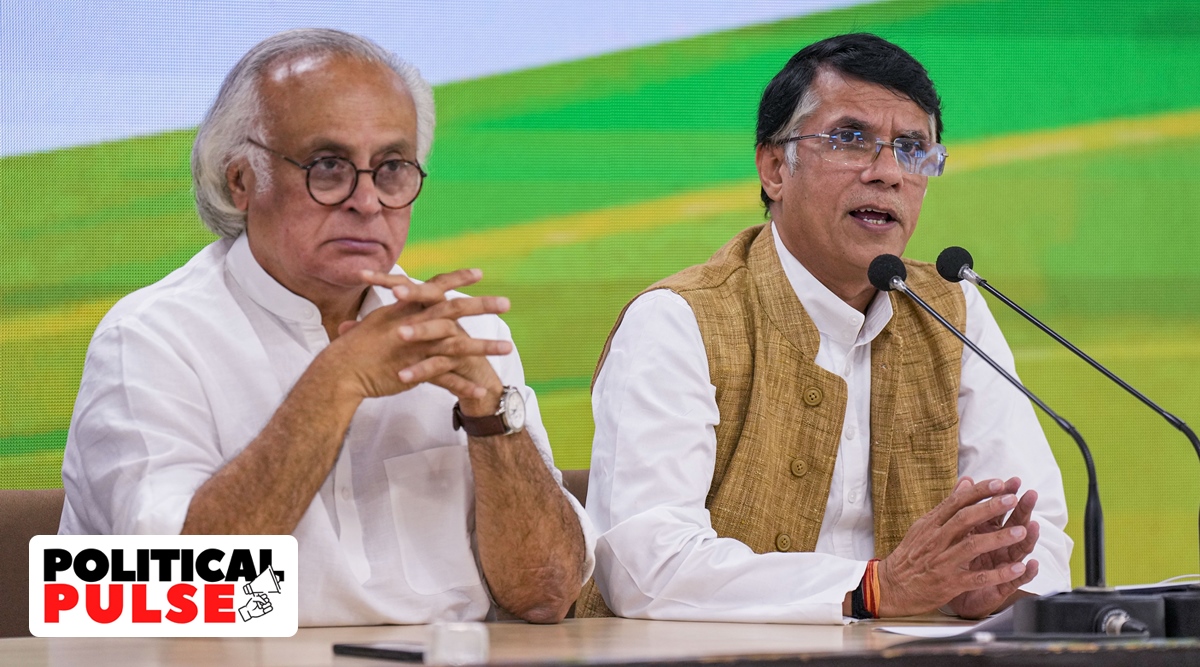


Congress spokesperson Radhika Khera has resigned from her position, citing mistreatment and harassment by party leaders from Chhattisgarh. In a press conference, Khera claimed that she was punished for being a "Ram bhakt" and that she was denied justice when she raised the issue with party leaders. The Chhattisgarh Congress president dismissed Khera's claims, stating that she was speaking the language of the opposition party.
Radhika Khera's Resignation from Congress: Background and Fallout
Congress spokesperson Radhika Khera recently resigned from her position, alleging mistreatment and harassment by party leaders from Chhattisgarh. The development has sparked a political storm, with accusations and counter-accusations flying between Khera and the party leadership.
Background:
Radhika Khera has been associated with the Congress party for over a decade. She has held various positions, including spokesperson for the Chhattisgarh Pradesh Congress Committee (CPCC). Khera is known for her outspoken nature and her strong support for Hindu nationalism.
Allegations and Resignation:
In a press conference on August 10, 2023, Khera alleged that she was subjected to mistreatment and harassment by certain CPCC leaders. She claimed that she was punished for being a "Ram bhakt" and that her pleas for justice fell on deaf ears.
Khera's resignation letter, which she shared with the media, detailed instances of being sidelined and denied opportunities within the party. She also accused party leaders of trying to suppress her voice and using caste and gender-based discrimination against her.
Congress' Response:
The CPCC president, Mohan Markam, has dismissed Khera's claims as baseless and motivated by her desire to join the opposition party. He alleged that Khera was trying to create a false narrative and that her resignation was a way to deflect attention from her own failures.
Markam also accused Khera of violating party discipline and of publicly attacking other leaders. He said that the party would not tolerate such behavior and that it would take appropriate action against her.
Fallout:
Khera's resignation has put the Congress party in a spot of bother. The allegations have exposed internal divisions within the CPCC and have raised questions about the leadership of Mohan Markam. The party is also facing criticism for its handling of the issue and for allegedly failing to address Khera's concerns.
The fallout from Khera's resignation is likely to continue in the coming days and weeks, with further revelations and counter-accusations expected. It remains to be seen how the party will manage this crisis and whether it will be able to mend the rift between Khera and the CPCC leadership.
Top 5 FAQs and Answers Related to Radhika Khera's Resignation and Past Events:
Why did Radhika Khera resign from the Congress party?
What were the specific allegations made by Radhika Khera?
How did the Congress party respond to Khera's allegations?
Has Radhika Khera faced any disciplinary action from the Congress party?
What are the potential consequences of Radhika Khera's resignation for the Congress party?

In a strongly worded statement, politician Shashi Tharoor expressed his opposition to the VB-G RAM G Bill that aims to replace MNREGA. Tharoor argued that the removal of Mahatma Gandhi's name from the scheme goes against its core values and also criticized other proposed changes such as financial alterations and a shift of responsibility to states. The politician believes that the Bill poses a threat to the principles of federalism and that the scheme should not be made subject to executive notification.

Union Minister Shivraj Singh Chouhan introduced the Viksit Bharat - Guarantee for Rozgar and Ajeevika Mission (Gramin): VB-G RAM G Bill, 2025 in the Lok Sabha. The bill aims to establish a new rural development framework aligned with the national vision of Viksit Bharat @2047 and seeks to provide a statutory guarantee of 125 days of wage employment to each rural household. The government is determined to pass the bill in this parliamentary session and failure to do so could complicate budgetary provisions.

In a significant move to improve academic standards, India's new Viksit Bharat Adhishthan Bill, 2025, places student feedback at the heart of higher education accreditation. Union Education Minister Dharmendra Pradhan, citing the National Education Policy 2020, announced that for the first time, students will have a direct impact on accreditation outcomes. The new framework will also increase institutional autonomy and encourage innovation, but with a strong emphasis on accountability through transparent student-led evaluations. The consolidation of regulators and accreditation bodies aims to streamline and strengthen the quality of higher education in India.

On the occasion of Vijay Diwas, a day commemorating India's 1971 victory over Pakistan, Rahul Gandhi, Leader of Opposition in Lok Sabha, paid his respects to the brave soldiers who showed indomitable courage, leading to the liberation of East Pakistan and the formation of Bangladesh. The date also marks the surrender of 93,000 Pakistani soldiers to the Indian Armed Forces and is a tribute to the bravery and sacrifice of Indian soldiers. Congress National President Mallikarjun Kharge also highlighted the 1971 victory as a great example of humanity and justice under the leadership of then Prime Minister Indira Gandhi.

Senior Congress leaders respond to Delhi court's refusal to take ED's chargesheet in the National Herald-Young Indian case, emphasizing the lack of evidence and foundation of the case. They accuse the BJP of exaggeration and targeting the opposition, claiming that the ruling has validated their long-held belief that the case is politically motivated. Congress leader Abhishek Manu Singhvi highlights the legality and commonality of corporate restructuring, while Congress general secretary K.C. Venugopal condemns the Modi government's targeting of Sonia Gandhi and Rahul Gandhi without any legal basis.

The Congress party declared a moral and legal triumph after the Delhi court dismissed the Enforcement Directorate's chargesheet in the National Herald-Young Indian case. The judge noted that the chargesheet was based on a private complaint rather than an FIR, making it legally inadmissible. The Congress accused the Modi government of maliciously targeting its leaders and misusing central agencies for political gain. They vowed to continue fighting for truth and democratic rights, asserting that nothing could deter them from their mission.

India commemorates Vijay Diwas every year on December 16 to honour the soldiers who sacrificed their lives during the 1971 war with Pakistan, which resulted in the creation of Bangladesh. As part of this year's celebrations, the Indian Army displayed a reconstructed Turkish armed drone, Yiiha, which was shot down by India during Operation Sindoor on May 10. The Kamikaze class of drones, also known as "suicide drones," were used by Pakistan to target Indian military and civilian installations, but were almost all destroyed by the Indian military.

India celebrates the 54th Vijay Diwas, honoring the bravery and sacrifice of its soldiers in the 1971 war that led to the liberation of Bangladesh. Political leaders, including Prime Minister Narendra Modi and President Droupadi Murmu, pay glowing tributes to the armed forces and their unmatched courage. The Army marks the occasion by recalling the historic triumph and the flawless coordination between different branches of the military, with an impressive Military Tattoo in Kolkata.

Renowned spiritual leader and former BJP MP, Ram Vilas Vedanti, passed away at the age of 67 due to a heart attack. Known for his significant role in the Ram Janmabhoomi movement, Vedanti had been admitted to a hospital in Rewa for a blood infection and low blood pressure. Attempts to transport him to a better medical facility were unsuccessful due to bad weather. Political leaders, including Uttar Pradesh Chief Minister Yogi Adityanath, expressed their condolences and praised Vedanti's contributions to society.

Indian Ambassador to the United Nations, Harish P, slammed Pakistan for misusing international platforms for its hostile agenda against India at the UNSC Open Debate on “Leadership for Peace”. He objected to Pakistan’s reference to Jammu and Kashmir and questioned its democratic credentials while reaffirming India’s stance on cross-border terrorism. This reflects the ongoing strain in India-Pakistan relations and New Delhi’s determination to counter any attempt by Islamabad to internationalise bilateral disputes.